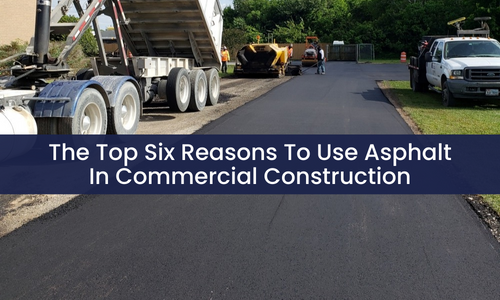Asphalt is one of the world’s most useful construction materials. According to the National Asphalt Pavement Association, 94 percent of all U.S. roads, 90 percent of parking lots, and more than 80 percent of commercial airport runways are surfaced with asphalt.
Construction professionals place a lot of trust in asphalt, and for many reasons. Some of those reasons include:
- Durability
- Cost efficiency
- Performance and safety
- Quick installation
- Versatility
- Sustainability
As you can see, there are many benefits associated with the material. We’ll take a closer look at each to give you the full picture on asphalt and why it’s a frontline paving choice.
Asphalt Pavement Can Last Indefinitely With Proper Maintenance
Although not quite as durable as concrete, asphalt is extremely robust in its own right and can flex when placed under extreme loads. Even better, asphalt paving can last with regular maintenance and the occasional resurfacing. This can be performed by an expert contractor quickly and inexpensively.
Asphalt pavement is made up of several layers, including base and intermediate layers that consist of aggregate and binder. If the asphalt is kept in good condition, you may never need to replace the base and intermediate layers. Your pavement foundation, in other words, can be a permanent feature of your commercial property.
Asphalt Construction Is Cost Efficient To Build And Maintain
Compared to other construction materials, asphalt costs significantly less to install and maintain. For the initial install, you can expect to pay up to 50 percent less than you would with concrete.
Following project completion, asphalt construction requires more maintenance than concrete, but this maintenance is generally of the routine variety, such as laying down fresh sealcoat. This kind of maintenance is cost-effective and can extend the usefulness of the asphalt.
If the asphalt does sustain damage, like cracks, potholes or water intrusion, asphalt contractors can usually cut out the failed asphalt and patch the areas with new material. Because contractors can target small parts of the asphalt for repairs, complete replacement is rarely needed. This keeps costs down further.
An Asphalt Surface Offers Excellent Performance And Safety
Asphalt is also the ideal driving surface, with ride characteristics that make for a quiet, comfortable experience. This is mostly due to the material’s smooth quality. Compared to other pavement materials, asphalt is much smoother and promotes maximum contact between road and tire. This means better skid resistance. Couple that with low vibration and it is clear how asphalt could improve parking lot and road safety. More alert drivers and more responsive vehicles add up to better reaction times.
Asphalt can also be easily colored or textured to improve safety further. The material’s dark color makes it a natural high-contrast choice for road markings such as lane dividers, and this improves visibility for motorists. Like concrete, asphalt can also be textured, and some areas are experimenting with this to designate special lanes like bike lanes and shoulders. When cars pass over the textured asphalt, the resulting feedback (vibration) is immediate.
Asphalt Can Be Installed Quickly
Once asphalt is laid down, it only needs to cure for a few days before it can handle vehicle traffic. Asphalt requires up to a year to completely cure, but it’s only slightly more susceptible to damage during that time. In terms of day-to-day wear, performance and safety, asphalt is ready for traffic in under 72 hours.
Compare this to concrete, for example, which typically requires a week before it is cured enough for traffic. If time is critical for your business, then asphalt’s rapid readiness could be a deciding factor.
Asphalt Can Be Used In A Variety Of Construction Projects
Asphalt pavement isn’t just physically flexible – it’s functionally flexible as well. Because the material is installed onsite, it can be tailored to any area, no matter the size of the job. This versatility makes asphalt an excellent pavement choice for roads, parking lots, parking garages, walkways, and driveways. Asphalt is also used in some reservoirs, parks, and retention ponds.
Asphalt is effective at mitigating soil erosion, and it can be used in various floodwater initiatives to facilitate efficient drainage. In short, asphalt can be adapted for a large number of projects.
Asphalt Construction Is Sustainable Construction
The asphalt industry has an excellent history of integrating sustainable processes into the creation and use of asphalt. In fact, more than 80 percent of all reclaimed asphalt is recycled and used in future construction projects. By weight, that takes more than 100 million tons of material out of landfills every year, making asphalt a true green material.
In addition to encouraging sustainable building practices, asphalt’s recyclability reduces material costs further. As the property owner, you will not have to spend more money on asphalt disposal costs, as the asphalt contractor can recoup transportation costs by routing the asphalt to recycling centers instead.
Expert Asphalt Contractors Know How To Optimize The Material’s Characteristics
Asphalt is long lasting, safe, cost efficient and, for experts, easy to repair. As such, it’s understandable why the material is so heavily utilized by contractors around the U.S. and world.
If you’re about to break ground on a new pavement or construction project, asphalt will likely fit into your plans somewhere. If they do, an expert contractor like the APC team will ensure your asphalt is mixed, installed, cured, and maintained properly for unmatched project quality.
- HOA & Condos – How Asphalt Pavement Can Affect Your Houston Property Values - March 6, 2025
- What Certifications or Licenses Should a Houston Asphalt Contractor Have? - September 17, 2024
- Common Challenges in Concrete Construction - September 11, 2024

